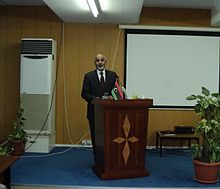- Mohamed Yousef el-Magariaf
-
Mohamed Yousef el-Magariaf (Arabic: محمد يوسف المقريف) is the former leader of the National Front for the Salvation of Libya (NFSL), a splinter opposition group to Muammar Gaddafi in the 1980s. He was formerly Libyan ambassador to India and before that was head of the board of auditors at the Libyan revenue court.[1] According to the International Security Council [2] he was "generally unknown in Libya except as a former functionary of the regime and without the capability of building a power base in the country, [he] nonetheless refused to pay heed to the advice of the more realistic opposition".[3]
The NFSL was founded in 1981, allegedly with CIA and Saudi Arabian funding.[4][5] According to Magariaf's own testimony, he traveled using passports with three different names, besides his own: "I carry three passports for the three identities I customarily use. The first in the name of Mohamed Khalil is a Jordanian diplomatic passport, the second in the name of Mohamed Ben Abdellah is an Algerian diplomatic passport, and as to the third, in the name of Abdellah Hassani, it is a regular Moroccan passport. I do not wish to specify the way I obtained these passports, in order to avoid embarrassing the countries concerned." [6] Critics within the NFSL accused him of centralizing and controlling all authority, information and funding unto himself. The group and Magariaf were caught off-guard by the speed of events in Libya in 2011, and played little role in them.
Magariaf's son, Tarik Yousef, served one term as the second dean of the Dubai School of Government (2007–2011).
References
- ^ [1]
- ^ (1986, p. 58)
- ^ [2][3]
- ^ [4]
- ^ [5]
- ^ [Transcript from the French Ministry of the Interior, General Department of National Police, Case Number 120/45/92, Abdallah Senoussi et al., Exhibit 15, from 27 April 1993, page D16271; translation into English by Tyler Mickelson of TransPerfect Translations, Washington, DC, 28 March 2005.]
- Banks, Arthur S., Thomas C. Muller, and William Overstreet. Political Handbook of the World 2008, CQ Press, 2008.
- International Security Council, Global affairs, Volume 1, Issues 3-4, 1986, pp. 56–59.
- International Strategic Studies Association, Defense & foreign affairs handbook, 2002 - Technology & Engineering
- Metz, Helen Chapin (1987). "LIBYA: a country study, Chapter 4. Government and Politics: Opposition to Qadhafi: Exiled Opposition". Federal Research Division, Library of Congress.
- Nutter, John Jacob (1999) (in English). The CIA's black opts. Prometheus Books.
- Woodward, Bob (2005). Veil: The secret wars of the CIA, 1981-1987. Simon and Schuster.
- Vandewalle, Dirk (2006). History of Modern Libya. Cambridge University Press.
Categories:- Living people
- National Front for the Salvation of Libya politicians
Wikimedia Foundation. 2010.

